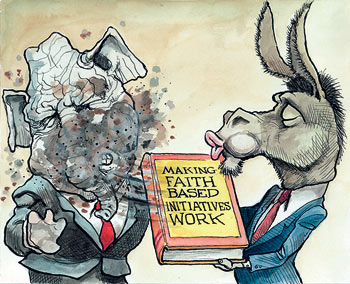I was talking to my friend Pia last week about poverty. She is an extraordinary woman committed to serving God with mind, heart, and hands. As we talked, she raised a question about the nature of poverty – about what constituted poverty. She wondered, in essence, if there was a hierarchy of poverty because she knew so many wealthy women who were trapped in “golden prisons” of poverty. I asked her to write up her thoughts and I’m grateful that she did…
In mainline Protestant churches, where social justice and advocacy are considered to be on the top tier of mission priorities, we often hear about the need to serve the poor, speak for those who are voiceless, and stand with those who are oppressed. In quoting Isaiah, Jesus proclaimed a gospel of ‘good news to the poor’, and this–particularly to us; people living in wealthy nation, many of whom have far more than we need–is a call not just to compassion but to action. It is a call that we should take very, very seriously. But of late I have been wondering about other, more subtle, forms of poverty–and indeed to follow the rest of Isaiah, brokenheartedness, captivity, blindness and oppression. Situated in a wealthy suburb of New York, my church often discusses the need to reach out to the poor and needy around us, particularly in less wealthy neighboring towns. Of late, however, I have begun to wonder if there are needs we are overlooking in our own ‘wealthy’ community, and sometimes even in our own church. Poverty is not just a term we apply to material conditions but to spiritual conditions as well, and there are many for whom oppression occurs as depression, brokenheartedness as an absence of compassionate community, blindness as stumbling in darkness and confusion about who they truly are, and captivity the form of an entanglement of cultural and spiritual snares that keep us bound by fear to greed, consumerism, competition and ‘achievement’. And there may well be few greater internal prisons than the crippling generalixed anxiety experienced by so many Americans, especially in light of the pervasive ‘culture of fear’ that fights to keep us ‘surviving’ rather than living in the abundant grace of the Truth.
For example, and speaking as a woman, I know there are many women out there in the ‘wealthy suburbs’ whose life is a living prison. A golden prison perhaps, but a prison nonetheless and their hearts are either broken or hardened by the need to survive. They are stressed, anxious, competitive, insecure and often very very lonely–and I would offer that this is because they do not know who they truly are in God. They fear their worth to be dependent on their looks, figure, sex appeal, achievements, intellect, income (or that of their husband) and sometimes even their ability to be independent. Perhaps there are others whose spirit was crushed long ago by parents, men, life perhaps, and their wounds have never known healing. Their brokenness and despair has not been met by the living God and so it subtly continues to inform their world view which they in turn impose on others. Is that not also form of deep need? Did Jesus not come to proclaim good news for them also? And are we so blinded by their wealth that we do not see their poverty? Or could it also be that their internal poverty and brokenness is too close to our own? Do we truly trust the living God with our own broken places?
A broken heart is a broken heart, regardless of race, nationality, religion or socio-economic status. Perhaps we need to be careful not to condemn the rich, even if we count ourselves among them, for being rich is not a sin any more than being poor is a virtue. It is what we do, or don’t do, with those conditions that we are called to be accountable for. In some cases proclaiming ‘good news to the poor’ may mean feeding the hungry, working for societal change through activism and advocacy, and seeking to understand and refute the systems of oppression whose constructs we may not even see until we begin to dig deep. But in other cases it may also require the willingness to acknowledge and open our hearts to someone who is sorely and desperately in need of the love, healing and liberation that can only come through encountering the Truth of God, and seeing past their material circumstances to broaden our own sense of the poverty, brokenheartedness, blindness and captivity that God is calling us to alleviate.

